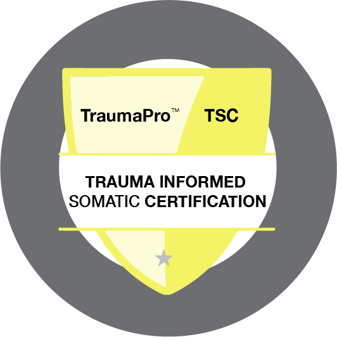TraumaPro TSC
Trauma-Informed Somatic Certification – TSC-I
Program Overview
The Trauma-Informed Somatic Certification provides essential tools to integrate the body into therapeutic processes and offer adequate emotional support. With a profound focus on trauma neuroscience and experiential somatic practices, this training will help you understand how the body stores and expresses stress and trauma, offering concrete techniques to facilitate regulation, healing, and resilience. This program is specifically designed for therapists, psychologists, and mental health professionals who seek to expand their practice toward more integrative, body-centered methods.
This certification is likely intended for:
Psychologists, psychiatrists, physicians, social workers, and counselors
Learning Objectives
Upon completion of this certification, participants will be able to:
Understand the foundational principles of somatic therapy and the neuroscience related to trauma and stress.
Identify bodily signs of emotional dysregulation and apply practical techniques to foster regulation and resilience.
Implement effective somatic methods, such as conscious breathing, grounding, interoception, and experiential techniques in therapeutic or coaching sessions.
Integrate ethical principles and explicit consent into professional somatic practice.
Develop clinical skills to safely and effectively support clients in resolving emotional, psychological, and physiological patterns related to traumatic experiences.
Who is elegible
Directed toward licensed or certified mental health professionals (e.g., psychology, psychotherapy, medicine), or advanced students in supervised clinical programs (CPT).
Participants agree to comply with the Professional Ethics Code of the Trauma Professional Association, encompassing confidentiality, informed consent, professional boundaries, and evidence-based practice.
Educational Background
A bachelor’s degree or clinical license in a relevant field such as:
Medicine
Psychiatry
Psychology
Social work
Counseling
Neuroscience
Nurse Practioner
Clinical Social Worker
Or a related discipline
This provides the foundational knowledge needed to understand mental health and therapeutic principles.
Professional or Academic Experience
Professional experience in mental health or therapy settings is preferred but not required. Examples include:
Therapist
Counselor
Social worker
Psychiatric nurse
Students currently enrolled in a relevant degree program (e.g., psychology or counseling) are eligible, provided they have completed basic coursework.


Education Standards
Core Training Hours
Requirement: Completion of a minimum of 80 hours of core training.
Components:
Lectures and Workshops: Topics include the history of psychedelic therapy, current research, pharmacology of psychedelics, and theoretical case studies.
Self-Study: Assigned readings, online modules, and literature reviews.
Purpose: Build a broad and deep theoretical understanding of Trauma Theory Framework and Somatic Interventions for Trauma
Assessment
Requirement: Successful completion of:
Exam: Covering the science of psychedelics, therapeutic frameworks, and ethical considerations or
Case Study Analysis: A 2,500–3,000-word submission analyzing a specific aspect of psychedelic therapy (e.g., its potential in treating anxiety or the role of set and setting).
Grading: On a pass/fail basis, a minimum score of 80% is required.
Purpose: Ensures participants can articulate and apply their theoretical knowledge effectively.
Supervision
Requirement: Completion of 20 hours of specialized supervision as detailed in the Psychotraumatology Handbook for Trauma-Informed Care
Focus Areas:
PTSD, Dissociative Disorders, Trauma Care
Theoretical trauma models of integration post-psychedelic experience.
Purpose: Develop a critical understanding of the trauma theory to integrate it into the Psychedelic-assisted Therapy
Grading: On a pass/fail basis, a minimum score of 75% is required.
Certification Renewal:
To maintain certification, the following are required annually:
18 hours of additional training in somatic or trauma-related topics (or 22 CE).
Submission of continuing education certification and payment of the renewal fee (99 USD).
If certification has lapsed for more than 3 years, reapplication will be required.
Trainings
All training that fulfills the education standards is eligible for certification, including, but not limited to, our approved educator providers.


Professional Code of Ethics for TSC-I
Ethical Code:
1. General Principles:
Certified professionals must act respectfully, with integrity and responsibility towards clients, colleagues, and students.
Maintain a safe and respectful environment, recognizing cultural, gender, identity, and social context differences.
2. Confidentiality and Consent:
Always maintain confidentiality of information shared in sessions, training, or supervision.
Obtain informed consent before using clinical material in demonstrations, recordings, or discussions.
3. Training and Competence:
Operate within one's professional training and competency scope. Do not represent competencies you do not possess.
Clearly and truthfully present the objectives, contents, and requirements of the training program.
4. Professional Relationships:
Avoid dual relationships (educational, therapeutic, or commercial) that could cause conflicts of interest or exploitation.
Reject any sexual relationship with clients, students, or supervisors during training or within the subsequent year.
5. Responsible Conduct:
Refrain from consuming alcohol or drugs that impair service or training quality.
Act professionally, avoiding harassment, defamation, or abuse in any training or therapeutic context.
Recognize professional errors and notify relevant authorities when appropriate.
6. Conflicts, Transparency, and Accountability:
Identify and proactively manage conflicts of interest in a transparent manner.
Share appropriate credit with instructors, theoretical sources, or colleagues, respecting intellectual property.
7. Supervision and Continuous Improvement:
Seek supervision when necessary and commit to evidence-based ongoing training.
Foster a culture of ethical, informative, and respectful feedback within the training team.
Violation of this Ethical Code justifies unilateral and immediate revocation of the issued certification. IPT reserves the unrestricted right to issue or withhold any accreditation, even if all requirements are met. Certification issuance is a right of the Association, not an entitlement of the applicant.
For further information contact certifications@iptrauma.org
Trauma Professionals Association
Dedicated to advancing Psychotraumatology treatment and research.
Community Care
Mailing list
info@traumapro.org
750 First Street, NE Washington, DC 20002
351-204-0840
© 2024. All rights reserved.
